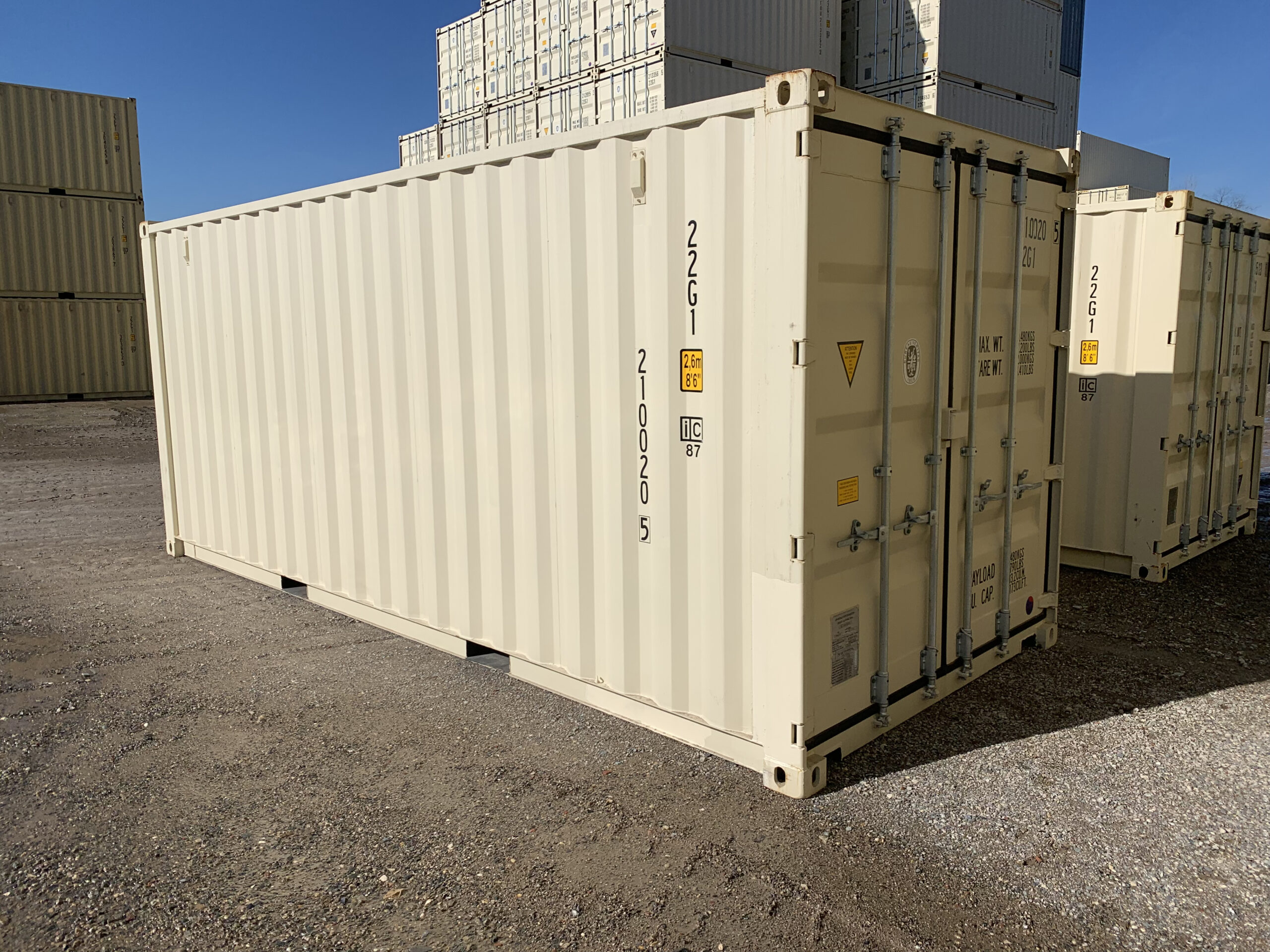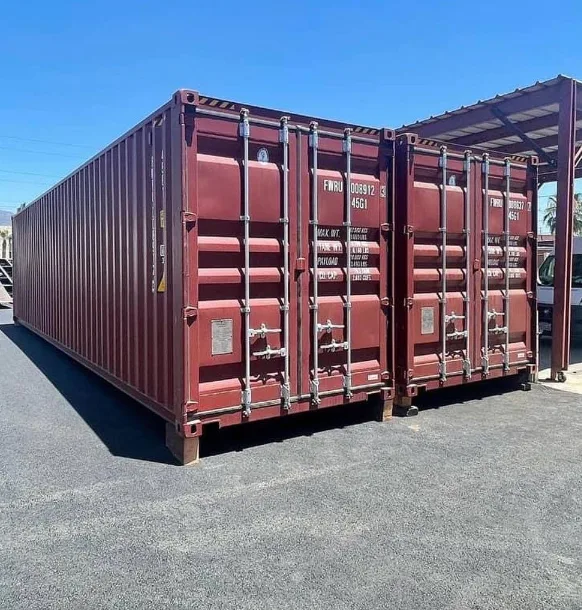Step-by-Step Process to Lease New Shipping Container 40 x 8 x 9.6 for Storage Solutions
Step-by-Step Process to Lease New Shipping Container 40 x 8 x 9.6 for Storage Solutions
Blog Article
The Ultimate Overview to Selecting the Right Shipping Container for Your Demands
When it comes to picking the best delivery container, comprehending your specific needs is crucial. You'll want to consider factors like size, type, and product to guarantee you make the finest choice. From basic dimensions to specialized choices, there's a whole lot to check out. And also, budgeting for both the container and any type of modifications can make a huge difference. Allow's damage down the vital facets to assist you discover the best suitable for your needs.
Understanding Shipping Container Sizes
When you're picking a delivery container, recognizing the numerous dimensions readily available is essential for making the best choice. Delivering containers generally come in standard lengths of 20 and 40 feet, however you'll additionally find other measurements. Understanding the size you need depends on what you intend to shop or transport.If you're moving smaller sized products, a 20-foot container might be excellent, while larger shipments typically call for a 40-foot container. The elevation can also vary; high dice containers offer extra upright room, which can be advantageous for taller goods.Before choosing, measure your freight, and think about how much area you'll require for packing and unloading. Constantly element in possible future requirements-- selecting a somewhat larger container might conserve you trouble down the line. Inevitably, selecting the appropriate dimension will certainly enhance effectiveness and assure your things are secure throughout transit
Types of Shipping Containers Available
There are numerous sorts of delivery containers offered, each developed for details purposes and freight demands. The standard dry container is flexible, perfect for general freight. If you're delivering perishable products, think about a refrigerated container, which maintains a controlled temperature. For oversized things, high cube containers provide extra elevation, suiting taller loads.If you need to move heavy machinery or devices, level shelf containers offer a strong base without wall surfaces. Open-top containers enable for simple loading of tall freight, with a detachable tarp covering for defense. If you're looking for flexibility, think about a collapsible container that can be conveniently saved when not in use.Lastly, specialized containers like tank containers are utilized for liquids, while vented containers are created for bulk cargo that requires ventilation. Understanding your cargo kind will certainly assist you choose the right container to fulfill your delivery needs successfully.
Material Factors To Consider for Longevity
When picking a shipping container, the material plays a crucial role in its resilience. You'll intend to consider the benefits of steel versus aluminum, specifically concerning rust resistance. Understanding these aspects can assist you make a more educated selection for your shipping requires.
Steel vs. Aluminum Containers
Exactly how do you pick in between steel and aluminum containers for your delivery needs? Beginning by considering toughness. Steel containers are durable and deal exceptional toughness, making them suitable for heavy tons and harsh conditions. They stand up to damages from effects and are frequently much less costly, which can be a significant element for budget-conscious buyers.On the other hand, aluminum containers are lightweight, which can save you on delivery costs. They're easier to maneuver and are a great choice if you need to transfer items often. Light weight aluminum is generally extra expensive and less durable than steel. Evaluate your specific needs thoroughly, including weight, expense, and the sort of cargo you'll be shipping, to make the appropriate choice for your situation.
Deterioration Resistance Elements
Choosing the right product doesn't just include weight and price; corrosion resistance plays a significant role in durability. When choosing a shipping container, take into consideration the atmosphere it'll deal with. Steel containers, while strong, can corrosion if not appropriately treated. Try to find choices with safety finishes or galvanization to enhance their lifespan. Light weight aluminum, on the various other hand, offers natural rust resistance, making it excellent for coastal locations or humid problems. However, it can be much more pricey. In addition, evaluate the container's usage-- if it'll be subjected to chemicals or rough weather, prioritize products that can withstand these conditions. Purchasing a corrosion-resistant container currently can save you from pricey repair work or substitutes down the line. Pick intelligently for long-lasting benefits.
Adjustments and Modification Options
Delivering containers aren't simply for transporting products; they can be transformed to meet your specific requirements via numerous alterations and modification alternatives. You can convert a basic container right into a relaxing workplace area, a short-term retail shop, visite site or even a personal fitness center. The opportunities are almost endless.Think regarding adding windows, insulation, or air flow to enhance convenience. You could likewise take into consideration electric circuitry, pipes, or also personalized shelving to improve capability. If security's a concern, reinforced locks can supply tranquility of mind.For aesthetic charm, you can paint the container or add a distinct design to make it stick out. Don't neglect concerning floor covering choices-- whether you desire sturdy plywood or something extra advanced, it can raise the space.Ultimately, tailoring your delivery container to suit your demands can boost usability and create an unique environment that shows your style.
Evaluating Your Transport Requirements
When it pertains to utilizing your modified delivery container, comprehending your transport needs is vital. Begin by determining what you'll be shipping-- whether it's heavy devices, retail products, or individual things. Each kind of freight has various requirements concerning size, weight, and accessibility.Next, consider the distance and setting of transportation. Are you shipping locally, country wide, or worldwide? This affects the container's design and functionality. If you're using trucks, assure your container fits conventional measurements for simple loading and unloading.Additionally, think concerning transit problems. Will your products require special security from climate or temperature changes? If so, you may require insulation or air flow features in your container.Lastly, assess exactly how frequently you'll be transferring goods. Frequent shipments might call for an extra long lasting and functional container to meet recurring needs. By attending to these factors, you'll be well-prepared to pick the best delivery container for your requirements.
Budgeting for Your Shipping Container
Setting a budget for your delivery container is vital for ensuring a smooth getting process. First, determine how much you can pay for to invest. Rates can differ significantly based on size, problem, and type. New containers normally cost more, but made use of ones can provide considerable savings.Next, take into consideration any type of added expenses you may incur, such as transport fees, shipment costs, and modifications. If you prepare to tailor the container, consider those costs also. Research different distributors to contrast prices and locate the very best offer that fulfills your needs.Don' t forget to consist of any licenses or policies that may relate to your purchase and use of the container. By go to my site clearly describing your budget, you'll be much better prepared to make enlightened choices, guaranteeing you get the ideal container without breaking the bank.
Maintenance and Look After Long life
To ensure your shipping container lasts for many years, normal upkeep is crucial. Beginning by examining the outside for corrosion, dents, and damages. If you spot any kind of problems, resolve them quickly to avoid additional damage. Clean the container occasionally, both within and out, to eliminate dust, particles, and wetness that can result in corrosion.Ensure the doors seal effectively and lubricate the joints to prevent rust and sticking. If you're utilizing the container for storage space, think about adding air flow to reduce moisture and mold and mildew development. For added protection, apply a rust-inhibiting paint or sealant annually.If your container's located in a rough environment, like coastal areas, you could require to raise maintenance regularity. Watch on the floor covering, too; any indicators of wear ought to be useful link repaired immediately. With these easy actions, you'll extend the life of your shipping container significantly.
Frequently Asked Inquiries
Just how Do I Discover a Dependable Shipping Container Vendor?
To find a reputable delivery container provider, beginning by looking into on the internet testimonials, requesting for referrals from buddies or sector contacts, and comparing costs. Constantly check their qualifications and assurance they supply high quality containers that meet your requirements.

Can I Rent a Shipping Container Rather Than Acquiring?
Yes, you can certainly rent out a shipping container instead of buying one. Lots of suppliers provide rental options, which can save you money and offer flexibility if you only need it for a brief duration.
What Permits Are Needed for Container Positioning?

Are Shipping Containers Weatherproof and Suitable for Outdoor Storage?
Yes, shipping containers are normally weatherproof, created to endure harsh conditions. Their robust building keeps your items safe and completely dry, making them ideal for exterior storage space. Simply ensure correct air flow to stop moisture buildup inside.
Exactly how Do I Move a Shipping Container As Soon As Bought?

Report this page